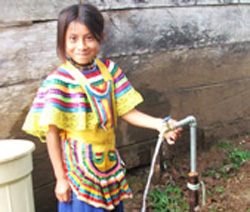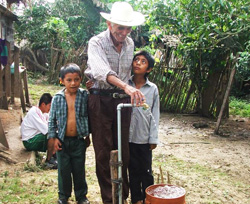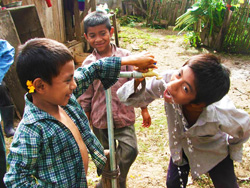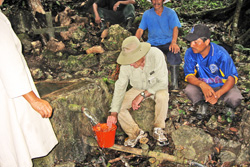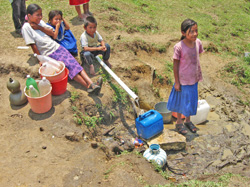How Waterlines works in...Mexico
Waterlines began working in the Altamirano area of the southern state of Chiapas in 2000, when the Saint Vincent de Paul Sisters started building their new hospital, and Waterlines supported the hospital's water system.
Since that time, Waterlines has supported projects in a number of remote communities in Chiapas, including...
- In Benito Juarez, a Tzeltal community of 800 people located 6 Km from Lake Miramar, Waterlines sponsored the renewal of the gravity-flow water system, using a spring 2 Km from the village in the midst of the Montes Azules jungle, with each family obtaining a tap at home.
- In Las Perlas, located 11 Km from Altamirano, Waterlines originally built a single large, rainwater-catchment tank. After a donor provided the community with funding to build a new church, I suddenly visualized a building that would include large water tanks in the architectural concept, using available wood and stone, together with the promise of the whole village to help with the building job. It took endless time to achieve the project, in part because Las Perlas was in a turmoil of political conflicts and suffered several attacks from neighboring towns. Also, the technical aspects were complicated because of Altamirano's isolation. In 2006 the project was finally completed, and for myself it is the very favorite project I have been able to realize. I am always thanking Waterlines for the fact that they were willing to sponsor such an unusual but beautiful way of gaining water.
- In Chum Cerro, a community of 220 people located 7 Km from Benito Juarez, a mile-long gravity-flow water system was recently installed with the help of Water Engineers for the Americas (WEFTA). Now in the dark, dense jungle on the mountains of the Montes Azules Reserve, every home has water. Chum Cerro is typical of isolated communities, where it is almost impossible to obtain help from official sources, so Waterlines' assistance is greatly appreciated.
In spite of the immense amount of water in Chiapas, many people have no clean drinking water, especially in Indian communities that by tradition have been forced to live in isolated areas that government programs do not reach. Since the beginning of revolts in 1994, political division among the Indian population (30 %) makes contact with the state capital even more difficult. Any help from "neutral" sources is more than welcome. I encounter request after request for water projects.


